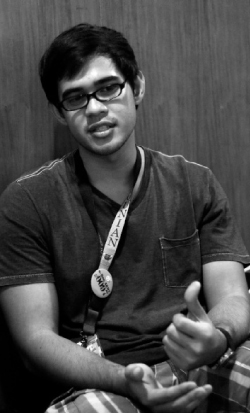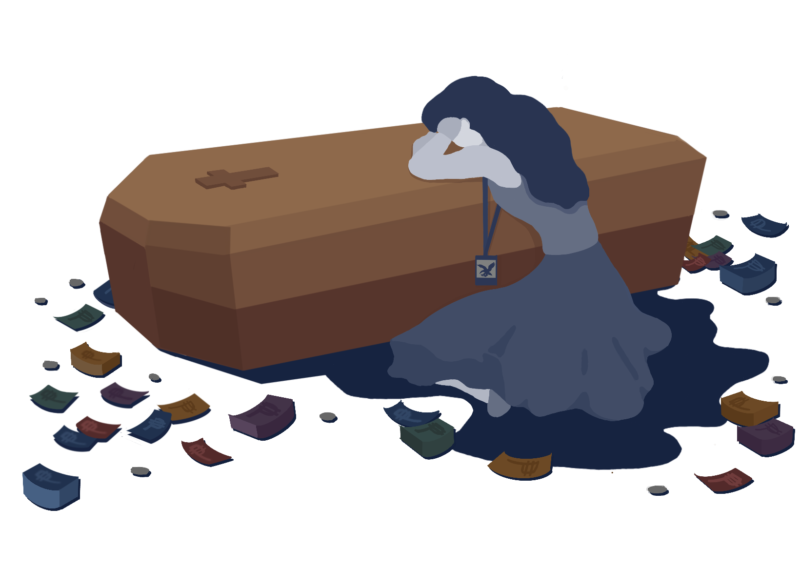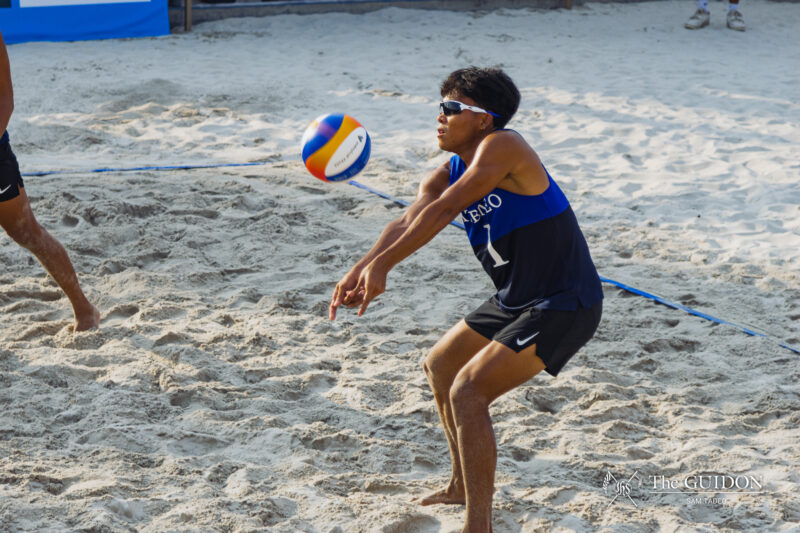
AN ABSENCE. “Walang tumatakbo. Eh ‘di wala kang iboboto,” says Gio Tingson, incumbent Sanggu president. Photo by Rico B. Cruz
The Loyola Schools (LS) general elections last year was an ordeal for the Ateneo Commission on Elections (Comelec). As the last voting day was approaching nightfall, 400 votes were still needed to meet the electoral quota. If this quota weren’t met, no one would have been elected.
Luckily, a disaster of such proportions was averted. A last-minute turn-out of voters gave the Comelec what they were hoping for; the quota was eventually met. The voting quota required for the elections is 50% + 1 of the non-graduating voting population.
Unfortunately, though, the same does not hold true for the School of Humanities (SOH)— the school didn’t meet the quota, and as a result, the elections for the said school was declared a failure.
A history of failure
But SOH’s woes actually began way before the voting days. During the candidate registration period, nobody from SOH stepped up to run for any of the Central or School Board positions.
This was one of the reasons why meeting the LS quota was such a struggle last year: there wasn’t any strong motivation for the SOH community to go out and vote.
The lack of candidates willing to run for the different positions in SOH resulted to the obvious. “Walang tumatakbo. Eh ‘di wala kang iboboto (No one was running. Therefore, there was no one to vote for),” says Gio Tingson, incumbent Sanggu president.
In an effort to accommodate the school, special elections were arranged specifically for SOH students in August last year, held alongside the freshmen elections.
However, the elections failed. Yes, for the second time.
Shortcomings
Maria Luz Vilches, dean of SOH, shares her experience last year when she first found out that the SOH students she’s been working with in the school board (who a lot of people expected to run in the general elections) were apparently not running after all.
“I didn’t want to express my surprise that nobody wanted to run… I thought… maybe they were just not ready, or [they were just] too busy with their work,” says Vilches.
While the last two elections and their failure to reach quota may be extreme cases, Bea Nakpil (IV AB Lit Eng), a legitimately elected former School Chair of SOH, admits that SOH in general has always had a hard time in meeting the electoral quota.
For Nakpil, some of the reasons behind why SOH voters played much more hard-to-get during the recent failed elections—even when there were candidates running already—lay in the absence of parties and the relatively new faces running. She says candidates already have a hard enough time campaigning even when parties are present to back them up; without these parties, one can only imagine how much harder campaigning gets.
Although this might hold true for the other schools as well, Nakpil thinks this is especially true for SOH students because the student body’s small size somehow makes them less a priority during campaigns, compared for example to management students who number around six to seven times more.
Alex Parungo (III AB Lit Eng) was one of the candidates who weren’t able to meet quota during the special elections. She blames the failure of elections partly on some shortcomings by the concerned bodies.
“During freshmen elections, [Comelec held special elections] for the [School of] Humanities… I think it was a little bit difficult ‘cause of the fact that it was special elections, and [the concerned bodies] have never run [special elections] before at that big a scale,” she says.
“Communication [was] difficult,” she recounts. She also says that all these things led to much frustration among the candidates.
The SOH identity
It is interesting to note, however, that a glaring similarity in the answers of Vilches, Tingson, Nakpil, and Parungo, exists, as to why the Sanggu elections have been failing in SOH.
In separate interviews for The GUIDON, the four have pointed out that, apart from the logistical and practical limitations, SOH’s less-than-stellar record in participating in Sanggu elections springs from a distinct identity SOH students have—“a different culture,” as Parungo puts it.
Tingson, a Philosophy senior, says, “Alam mo naman tayo sa humanities—mas liberal (You know how we are in the School of Humanities—more liberal). We have the [mindset leading us to think,] ‘I can move without structures; I can move without these [formalities] in play.’”
Nakpil says, “I think that maybe the humanities students are a lot more critical when it comes to elections. You know, they really gauge [the elections] in terms of how the Sanggu functions within the school, [within the] the student body.” She adds that she finds it harder to convince SOH students to vote.
Vilches agrees. “I think the problem is where these perceptions are coming from. Their idea of apathy—it’s biased.”
Vilches recounts how the absence of SOH candidates last year turned out to be quite a pleasant surprise for her. Because of the absence of a school board, Vilches was initially afraid of how things were going to turn out for the school; however, she decided the best way forward was to call for a team of volunteers in place of elected officials.
“When I asked [SOH students] to put together a team, there were lots of volunteers… And they worked! They were the ones who worked on Arete [SOH week], and it was well!” says Vilches.
When Vilches asked the volunteers why they didn’t run even if they were doing the functions of SOH Sanggu officers, they answered how “it’s not part of their entire thinking, that they need to run to be able to do the work.”
Tingson agrees. “If you look further into it, there’s a bias against the Sanggunian [in SOH], na parang ayaw nilang magpakulong sa estruktura, na iniisip nila (as if they don’t want to get caged in the structure, as if they’re thinking), it’s something that would disable them from doing what they want to do, from expressing themselves,” he says.
This thinking is very much apparent in Vilches’ narration of her experience with the SOH volunteers. “They were saying, ‘We don’t need to put up our own advertisements saying, Hey vote for me because I’m like this, I’m like that! We just want to help!’” she says.
“Maybe [things like this] aren’t part of the nature of being in the humanities: it’s just that people sometimes want to do certain things, but they do not need to follow a certain kind of protocol.”
Vilches is quick to clarify, though: “I’m not saying of course that they should not run—I still would go by that line, because for me, that’s formation. But for them to run coming from a false motivation—I wouldn’t be happy about [that].”
In the end, though, Vilches remains adamant that the humanities students should not be subjected to unfair criticism and negative press just because of the failed elections.
“If people say that [failing to reach election quota has] given a bad name to the humanities, maybe it has given it a bad name,” she says. “[But that’s] from the perspective of one who doesn’t really see what’s [going on in the humanities], because we’re always being judged according to the mainstream kind of thinking.”
Nevertheless, run
If the four are to be asked, though, they still think that SOH’s participation in the framework of the Sanggu is still beneficial for it. For Vilches in particular, participating in Sanggu work still offers some very formative opportunities that cannot be easily come by through other avenues.
She says she told the SOH volunteers that in running for a position in the Sanggu, “you are not just running because you want to run; this is part of your leadership training, and I would also like for you to take that up.”
Vilches made it a point to tell the volunteers that people cannot just say “no” to certain things, especially when they venture out of college: people will still have to go by certain rules and guidelines. As such, she asks the volunteers to still consider running because it’s important for formation.
In the same vein, even while Tingson recognizes the unique mindset of the SOH students, he rejects their commonly held notion of the Sanggu as a disabling rather than an enabling structure. Tingson thinks otherwise.
“When you’re in the Sanggu, there are more avenues for people to enable themselves to act, to enable themselves to express themselves.”
For him, SOH’s non-participation is a missed opportunity. “Pilay na pilay [there’s no leg to stand on] when it comes to Humanities. There’s no level of consultation.”
In fact, Tingson says that when Sanggu was determining its thrusts for the current school year, he was the only one present from SOH, compared to the complete boards for the other schools. He says he found it scary to see no such representation for SOH.
Representation is also one of Nakpil’s main worries about SOH’s reluctance when it comes to elections. “It’s really essential that the Humanities does have a position within the Sanggunian, because our views are not necessarily the views of people from [other Loyola Schools], so you really need someone there who embodies the School of Humanities,” she says.
She also says that because of the absence of a mandate from the electorate, SOH’s volunteers have no voting powers within the Sanggu. She also cites the passage of Sanggu’s resolution on spiritual maturity authored by Rob Roque.
“[If SOH had representatives, I’m sure a lot of these reps] would have voiced out opposing views [against that resolution]… because it’s a guideline that goes against liberalist views, or humanities in general,” she says.
Tingson agrees that the volunteers could only do so much. He stresses that the benefits of an elected board still very much outweigh that of a voluntary team.
“There’s value in [a situation where] early on, you’re already organized; early on, [you’ve already determined] your resources; early on, you’ve already seen the strategy,” says Tingson in mixed English and Filipino, on the benefits of an elected board.
“What happened this year with the volunteers was merely something along the lines of, ‘Let’s just talk if we need to do something.’”
Still, Tingson is happy that a lot of candidates ran for SOH positions during the Sanggu elections this year.
“I think that many have seen the importance of playing a role in governance. That’s why we have people running again,” he says.
With reports from Niko S. Lok







Been waiting a long, long time for this article <3 Great job Luther, Niko 🙂
[…] SOH has had a history of difficulty when it comes to meeting the voting quota. […]